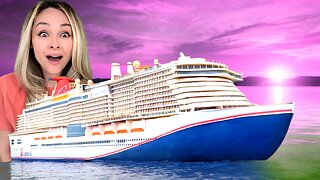Premium Only Content

Pakistan transportation🚇🚍🚋
Pakistan's transportation infrastructure encompasses various modes of travel, reflecting its diverse geography and population centers. Here's an overview:
### Road Transportation:
- **Roads:** Pakistan has an extensive road network, including national highways and regional roads. The National Highway Authority manages the major highways connecting key cities and regions.
- **Urban Transport:** Major cities like Karachi, Lahore, and Islamabad have developed urban transport systems, including buses, taxis, and ride-sharing services.
### Rail Transportation:
- **Pakistan Railways:** The national rail service connects major cities and towns across the country. It offers both passenger and freight services, playing a vital role in the transportation of goods and people.
### Air Transportation:
- **Airports:** Pakistan has several international and domestic airports, with the major ones located in Karachi, Lahore, and Islamabad. Pakistan International Airlines (PIA) operates both domestic and international flights, while several other airlines serve domestic routes.
### Water Transportation:
- **Ports:** Pakistan has two major ports: Karachi Port and Port Qasim, both located in Karachi. These ports handle significant maritime traffic, facilitating trade and commerce with other countries.
### Challenges and Developments:
- **Infrastructure Development:** Pakistan has been investing in infrastructure projects to improve transportation efficiency and connectivity.
- **Challenges:** Challenges include congestion in urban areas, maintenance issues, and the need for modernization in certain sectors.
- **CPEC:** The China-Pakistan Economic Corridor (CPEC) is a significant development project aiming to improve transportation and trade links between Pakistan and China, including road, rail, and port infrastructure.
Overall, Pakistan's transportation network is undergoing development to meet the growing demands of its population and economy.
-
 LIVE
LIVE
Major League Fishing
4 days agoLIVE! - MLF Bass Pro Tour: REDCREST - Day 3
22,124 watching -
 6:15
6:15
SKAP ATTACK
1 day agoGiannis Goes Full FREAK MODE in Historic Game
2.58K -
 19:35
19:35
DeVory Darkins
1 day ago $29.53 earnedMedia suffers failure after Elon Musk hit piece gets DEBUNKED
67.7K124 -
 12:38
12:38
Talk Nerdy Sports - The Ultimate Sports Betting Podcast
3 hours ago4/5/25 - Talk Nerdy Sports – Madness. Money. Mayhem.
25.9K4 -
 3:18:37
3:18:37
I_Came_With_Fire_Podcast
12 hours agoTHE HUNDREDTH EPISODE!!!
44.6K7 -
 LIVE
LIVE
Gatoroz
5 hours agoTake Me Back To Verdansk
175 watching -
 LIVE
LIVE
STGKAMZZ
6 hours ago"🔥Blunt & Battle: Chill Vibes Only in COD Ranked! 🌼💨 Spring Saturdays Just Got Epic!"
117 watching -
 34:00
34:00
Tactical Advisor
4 hours agoRetiring This Rifle | Vault Room LIve Stream 019
34.2K9 -
 16:29
16:29
Sideserf Cake Studio
6 hours ago $2.87 earnedThis Cruise Ship Is A CAKE!
45.2K6 -
 14:49
14:49
Clownfish TV
21 hours agoNintendo Switch 2 BACKLASH! Gamers BOYCOTT Over Pricing?!
32.7K10